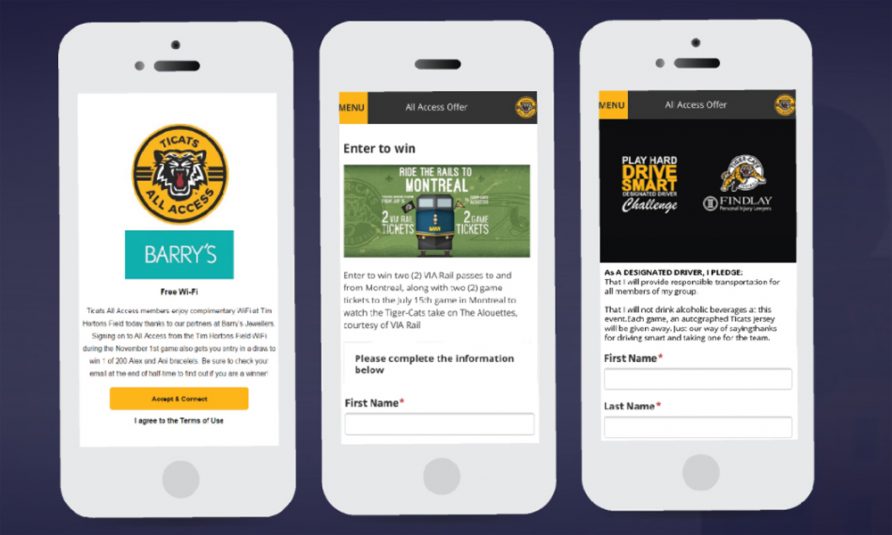Stadium Digital Is Changing Sports Organizations’ View on Digital and the Role of Video in Fan Engagement
Canadian company is showing how video can be valued in a team’s loyalty program
Story Highlights
For a sports team, what is digital? Is it social media? Or streaming video? Or in-stadium Wi-Fi? Or tickets on a mobile device? It’s all those things, and much more.
Embracing sweeping technological change like that across an entire sports organization has proved difficult in sports, an ecosystem notorious for its siloes and internal politics. One of the teams that has adjusted to this new environment in North America is the Hamilton (ON) Tiger-Cats of the Canadian Football League. As part of the move to a new stadium in 2014-15, the Tiger-Cats completely reimagined their fan-facing product in everything from marketing to content to ticketing, with a focus on developing robust, individualized relationships with fans.

The CFL’s Hamilton Tiger-Cats sought a robust, individualized relationship with fans through digital marketing, content, and more.
The Ticats have done this through its partnership with Stadium Digital, a full-service firm that specializes in digital revenue generation through technology across the entire organization. Driving ticket sales, deploying video content and gaming as part of a loyalty program, and more, Stadium Digital’s goal is to foster that one-on-one relationship to enhance the fan experience.
“Our goal is to change the way [teams] think about digital,” says Mark Silver, President, Stadium Digital. “It is part of the ecosystem of operating a team and part of how they execute. It’s not what are you doing on social? It’s what are you doing to drive the business of the organization.”
So how does video play into this? Stadium Digital believes that, for teams, video content can be used more strategically (and exclusively) to develop further touchpoints in the experience and build closer relationships with fans that can lead to further business opportunities.
“Video has always played a prominent role for us,” says Silver. “What’s really changed is the mechanism of how we deliver it. Clients have a feature in our platform called Exclusive Content. Higher-value content is what’s important here, because, if it’s content that’s available on the team’s website, the league’s website, or a bunch of other media properties, there’s no reason for us to put this gate around it. We push our clients – though its completely their decision — to put their best stuff that’s not so time-sensitive inside our platform. This isn’t every day. Maybe once a week, put a new piece of content in there and promote it.”
Through this, teams like the Tiger-Cats are able to use social media as a marketing tool, not just for content viewing but to use that content as an opportunity to retain that fan and obtain more useful data on their habits. Content can be wrapped in incentives for fans to identify themselves through things like contests.
Stadium Digital is able to run a platform that’s hyper-focused through video, thanks to its work with Verizon Digital Media Services. VDMS’s SmartPlay and One-to-One session-management features allow Stadium Digital to create a unique video experience for every single user accessing a team’s Stadium Digital-run digital environment.
“From a tech perspective, the scale is there,” says Rick Capstraw, VP, North American sales, Verizon Digital Media Services. “The one difference with what we’re doing is running individual streams and sessions, so the potential personalization is there from a delivery-technology standpoint.
“The other side of that,” he continues, “is harnessing all of the data and preferences to be able to do something interesting with it. What we’re seeing across the board today is how targeted we can make advertising. That’s important and helpful as media companies start to go over-the-top in an effort both to reach consumers directly and to mitigate potential MVPD subscription losses. Being able to target better and monetize better in a traditional ad event is, in my view, a bridging step and is something everyone is pretty well situated to be able to do today.”
Now in its third year with Stadium Digital, the Tiger-Cats are an example of what can be done when the entire organization embraces a digital-first strategy and platform. That’s a task that even Silver acknowledges is not always easy and requires a champion within the organization to see success.
“Often,” says Silver, “what we’re doing is quite disruptive inside organizations, because marketing is over there, content is over there, ticketing and sponsorship over there. But what we’re doing impacts so much of the organization that you need somebody somewhere to be your champion. That person needs to be empowered to determine what they are going to do with this and to execute it across the entire organization.”
